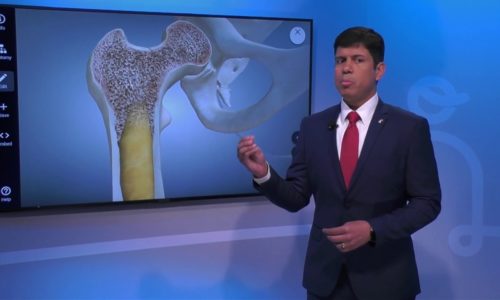TMJ Disorders: Symptoms |
Dr. Moises Lustgarten, Pain Medicine Physician with Baptist Health South Florida, says TMJ is a painful condition that involves the temporomandibular joint. “That’s a joint that is right in front of your ear, in the face.” Some of the symptoms are severe pain contractions in the muscles of the face, pain when eating, pain when speaking, and sometimes the joint gets stuck when opening or closing the mouth.
He also explains sometimes it goes away on its own, and sometimes you require to see a doctor and to treat it.
Transcript
Will you tell us first what TMJ? > Well it’s a painful condition that involves your temporal mandibular joint. That’s a joint that it’s right in front of your ear in the face, right here. it precent has severe pain contractions in the muscles of the face that occur at night, pain when you eat, sometimes when you speak, sometimes your joint gets stuck where you can open or close your mouth and and it can be quite painful and debilitating. > Does it go away on its own or is it something that you have to see a doctor to sort of loosen it up? > Sometimes it goes away on its own. Sometimes you require to see a doctor and to treat it. > I remember having that TMJ pain and someone said… the doctor had said “do you grind your teeth at night” and I said no I don’t grind my teeth at night. But find out later going to the dentist that I did grind my teeth and it was causing some of that TMJ pain. Is that something that’s very common? > It’s very common. Patients that have TMJ problems usually have contracted muscles in the cheeks and that clenches your jaw at night and people grind their teeth when they’re asleep. >Wow. And that stress and anxiety can contribute to TMJ pain is that true? > Yes. > in what way? > Well usually when you’re asleep — yeah — those muscles tend to contract and cause the grinding and it’s related to stress and anxiety. > How do you ease that pain? You said it’s very painful I can’t imagine not being able to be able to open my mouth or close my mouth so… > Well the first thing is the right diagnosis and that’s usually the first thing that patient will see is a dentist, cause “I have all these pain here my jaw, can’t eat, I can’t chew” it and then once you have a diagnosis of TMJ there are certain medications that can help you sleep. — right — Muscle relaxers that can help you loosen up the contractures in the muscles and there are inflammatory medications they can alleviate the pain, and in some extreme cases you may need surgery to fix the problem within the TMJ.








